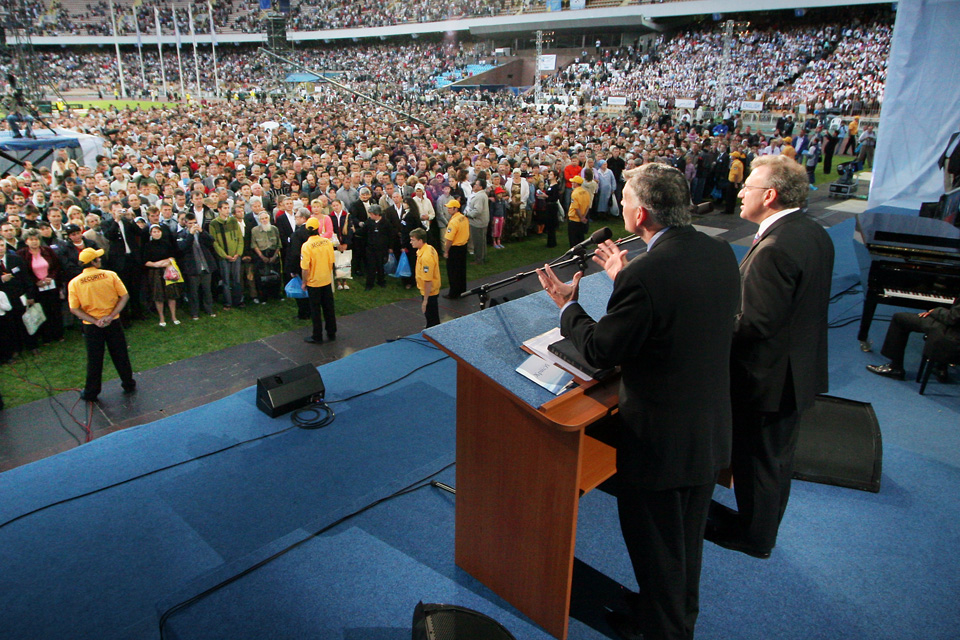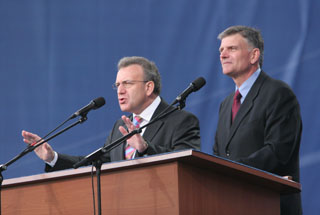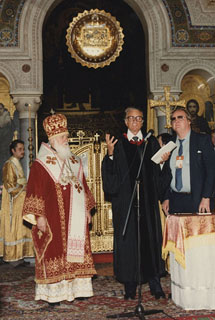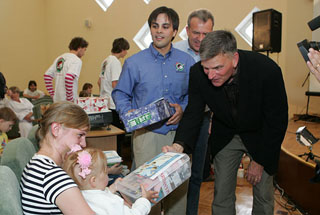
Viktor Hamm arrived in Kiev, Ukraine, Monday in the midst of an escalating crisis that has grabbed the attention of the world.
Hamm, the Billy Graham Evangelistic Association’s Vice President of Crusades, knows the region well. Born inside an infamous Soviet labor camp in what is now northwest Russia, he became a Christian preacher—against all odds—and has preached the Gospel on Ukrainian street corners, military bases and in stadiums as a BGEA associate evangelist.
But before Hamm ever dreamed of proclaiming the hope of Christ publicly in Ukraine, Billy Graham helped fling open the doors of evangelism in the Soviet Union when he first visited the region in the 1980s, under Communist rule.

Decades later, his son, Franklin Graham, would continue to carry the torch by sharing the Gospel with tens of thousands of Ukrainians in 2007.
This week, Viktor Hamm is returning to Ukraine to encourage the many churches affected by the violent uprisings that have taken place in the country.
“My visit to Ukraine is to show BGEA support to the churches and encourage church leaders to focus on Kingdom goals even in this tragic hour,” he said.
Hamm planned to meet with his friend, Oleksandr Turchynov, who was thrust into the international spotlight when the Ukrainian parliament ousted President Viktor Yanukovych and made Turchynov acting president of the country. (Update: Read about their meeting here).
“Mr. Turchynov is a member of an evangelical church in Kiev, a solid evangelical believer, a Brother in Christ and a great political leader,” Hamm said. “With all that he has on his plate right now, he needs our prayers for great wisdom, stamina and peace.”
Hamm’s visit to an increasingly divided Ukraine comes 26 years after Billy Graham visited the same city, when it was still under Communist rule.
In June of 1988, Mr. Graham was invited to visit the Soviet Union to celebrate the 1,000th anniversary of Christianity in the region. In 988, Prince Vladimir had baptized the people of the region in the Dnieper River.
“As Prince Vladimir changed and turned from idols, you must change and turn to Christ,” Mr. Graham told crowds gathered at Kiev’s Shevchenko Theater on June 14, 1988.

That same day, he preached the Gospel to a crowd of about 15,000 gathered at Kiev’s most famous Orthodox cathedral. Military generators manned by Soviet troops supplied the power for loudspeakers that broadcast the message into the streets, where Mr. Graham’s voice could be heard a block away. The September, 1988, edition of Decision magazine reported “church bells pealing for the first time in decades.”
Spiritually and politically, it was an historic moment—one that Hamm says could only have been orchestrated by the Lord.
“Never before, had an evangelical preached in an Orthodox church to such an extent,” he said. “After 70 years of atheism, for the first time the Gospel was proclaimed publicly to large crowds. God used this occasion to bring about a new era in the Soviet Union, the largest country in the world.”
Hamm said the number of evangelical Christians in Ukraine quadrupled during the 25 years following the BGEA’s first visit to the country.
Once the doors had been opened to evangelism, Viktor Hamm followed in Mr. Graham’s footsteps, preaching at 16 BGEA Crusades in Ukraine between 1994 and 2006.

In 2007, Franklin Graham was part of another historic moment for Christianity in Ukraine, when some 90,000 people heard the Gospel at the Ukraine Franklin Graham Festival of Hope in Kiev.
Following a series of political protests that Hamm said led to a sense of hopelessness among many Ukrainians, the local churches took an opportunity to tell their friends and neighbors about the hope of Jesus Christ.
Now, seven years later, Ukrainian believers once again face a choice: give in to hopelessness as they mourn the deadly violence that has rocked their nation…or, cling to the hope they have in Christ, and work for peace.
“We need to encourage all Christians around the globe to pray for Ukraine and Crimea,” Hamm said, “that believers would be strengthened in their faith, that churches would not be divided along ethnic lines, that the country would be preserved as a whole, since it has the strongest evangelical witness in Europe.”
A March 3 CNN.com article described Ukraine as “torn between whether Russia or the Western economies (including the European Union) is the savior it needs.”
Ukrainian believers would argue that only one Savior can bring lasting peace to the region—the same Savior who has carried the churches through more than 1,000 years of history—Jesus Christ.
In this case, Mr. Graham’s words from his 1988 visit to Kiev may be more appropriate now than ever:
“One thousand years ago Kievan Rus stood at a moral and spiritual crossroads which would determine its future. In like manner, our world stands at a moral and spiritual crossroads. Our world today needs a spiritual ‘perestroika’—a spiritual transformation.
“As a Christian, I believe only the rediscovery of the Bible’s unchanging message can give us lasting meaning and hope.”

